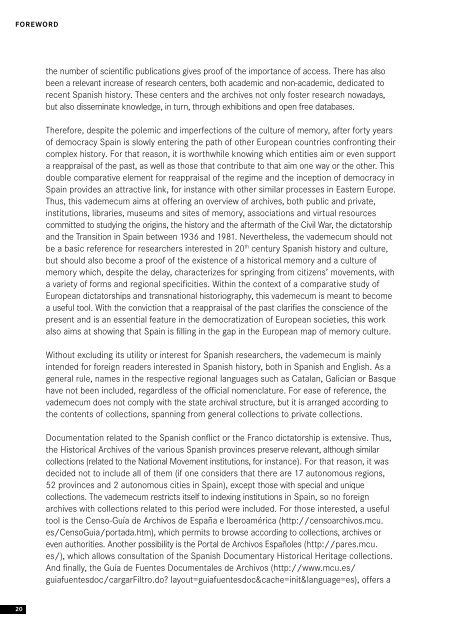Vademecum
Vademecum
Vademecum
Create successful ePaper yourself
Turn your PDF publications into a flip-book with our unique Google optimized e-Paper software.
FoRewoRd<br />
20<br />
the number of scientific publications gives proof of the importance of access. there has also<br />
been a relevant increase of research centers, both academic and non-academic, dedicated to<br />
recent Spanish history. these centers and the archives not only foster research nowadays,<br />
but also disseminate knowledge, in turn, through exhibitions and open free databases.<br />
therefore, despite the polemic and imperfections of the culture of memory, after forty years<br />
of democracy Spain is slowly entering the path of other European countries confronting their<br />
complex history. For that reason, it is worthwhile knowing which entities aim or even support<br />
a reappraisal of the past, as well as those that contribute to that aim one way or the other. this<br />
double comparative element for reappraisal of the regime and the inception of democracy in<br />
Spain provides an attractive link, for instance with other similar processes in Eastern Europe.<br />
thus, this vademecum aims at offering an overview of archives, both public and private,<br />
institutions, libraries, museums and sites of memory, associations and virtual resources<br />
committed to studying the origins, the history and the aftermath of the Civil War, the dictatorship<br />
and the transition in Spain between 1936 and 1981. nevertheless, the vademecum should not<br />
be a basic reference for researchers interested in 20 th century Spanish history and culture,<br />
but should also become a proof of the existence of a historical memory and a culture of<br />
memory which, despite the delay, characterizes for springing from citizens’ movements, with<br />
a variety of forms and regional specificities. Within the context of a comparative study of<br />
European dictatorships and transnational historiography, this vademecum is meant to become<br />
a useful tool. With the conviction that a reappraisal of the past clarifies the conscience of the<br />
present and is an essential feature in the democratization of European societies, this work<br />
also aims at showing that Spain is filling in the gap in the European map of memory culture.<br />
Without excluding its utility or interest for Spanish researchers, the vademecum is mainly<br />
intended for foreign readers interested in Spanish history, both in Spanish and English. As a<br />
general rule, names in the respective regional languages such as Catalan, Galician or Basque<br />
have not been included, regardless of the official nomenclature. For ease of reference, the<br />
vademecum does not comply with the state archival structure, but it is arranged according to<br />
the contents of collections, spanning from general collections to private collections.<br />
Documentation related to the Spanish conflict or the Franco dictatorship is extensive. thus,<br />
the Historical Archives of the various Spanish provinces preserve relevant, although similar<br />
collections (related to the national movement institutions, for instance). For that reason, it was<br />
decided not to include all of them (if one considers that there are 17 autonomous regions,<br />
52 provinces and 2 autonomous cities in Spain), except those with special and unique<br />
collections. the vademecum restricts itself to indexing institutions in Spain, so no foreign<br />
archives with collections related to this period were included. For those interested, a useful<br />
tool is the Censo-Guía de Archivos de España e iberoamérica (http://censoarchivos.mcu.<br />
es/CensoGuia/portada.htm), which permits to browse according to collections, archives or<br />
even authorities. Another possibility is the Portal de Archivos Españoles (http://pares.mcu.<br />
es/), which allows consultation of the Spanish Documentary Historical Heritage collections.<br />
And finally, the Guía de Fuentes Documentales de Archivos (http://www.mcu.es/<br />
guiafuentesdoc/cargarFiltro.do? layout=guiafuentesdoc&cache=init&language=es), offers a


